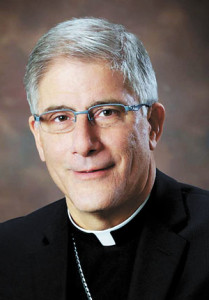
+Bishop Joseph R. Kopacz
By Bishop Joseph Kopacz
Throughout the Catholic Church in the United States many are agonizing over the revelations of Cardinal Theodore McCarrick’s crimes against minors, flagrant abuse of power, and unrestrained sexual behavior with seminarians and others. Hurt, anger and shame are casting a widespread pall over the faithful as old wounds are ripped open. There are many unanswered questions but as ugly as the truth will be, the truth will set the victims and their families, and the Church on the path to healing, justice and new life.
The disclosure of the sinful behavior of a high-ranking prelate in the Church does not undermine all the good work that the Catholic Church has done to protect children and young people since 2002, but it is an awful setback in the efforts to restore trust. The vast majority of Catholic dioceses in the United States have worked hard during the past 16 years to be faithful to the Promise to Protect and the Pledge to Heal, the document we know as the Dallas Charter. The fostering of safe environments in our ministries is now the norm, and the steadfast support for victims of sexual abuse who struggle for healing and hope in their lives, has been an unflagging commitment.
The results are commendable because Church safe environment programs and protocols have reduced significantly the abuse of minors by Church personnel. However, we also know that it takes 20 to 30 years on average for a victim to muster the resolve to come forward with their tragic story. This was the case with Cardinal McCarrick’s victims. Many never reveal their woundedness because it is just too painful to do so.
This is the reason why we repeatedly disseminate the statement that encourages all victims of sexual abuse by Church personnel to come forward no matter how long ago the abuse occurred. Suffering has no statute of limitations. Sexual abuse is an evil and a crime that wreaks havoc, destruction and despair, and the enemy, the Evil One, loves it, because it is shrouded in darkness, lies and shame. It unleashes the power of hell upon victims and their families and it often spreads from one generation to the next unless the cycle is broken by the light of truth, healing and reconciliation.
Earlier in my priesthood, I had the opportunity to teach Human Development during a 15-year span to early adolescents in three of our elementary schools in the Diocese of Scranton. The gift of sexuality is flowering at this age and to know that there are those in the Church who would prey upon these young teens, and upon minors at each stage of their development, is an unconscionable assault against human dignity. In the Diocese of Jackson we are committed to foster safe environments in our Catholic Schools, in our Religious Education Programs and in our Youth Ministries so that the children and young people entrusted to us can reach their God-given potential in every aspect of their lives.
Moreover, I served as a Formation Director for 14 years at our College Seminary in Scranton, Pennsylvania and to hear of the exploitation of young men who are discerning a vocation by those in authority who should be nurturing them, also cries out to heaven for justice. Transparency and the cultivation of a culture of trust, respect and accountability are the standards at the seminaries where our Jackson seminarians are in formation: Saint Ben’s (St. Joseph Seminary College) in Covington, Louisiana, Notre Dame in New Orleans, and Sacred Heart in Hales Corner, Wisconsin.
For the past two years as a member of the United States Conference of Catholic Bishops, I have been serving on The Committee for the Protection of Children and Young People. This places me at the center of the Church’s ongoing resolve to protect and to heal as set forth in the Dallas Charter, and to apply these efforts and best practices to our own network of safe environments in our Diocese. The Charter directs action in all the following matters:
• Creating a safe environment for children and young people;
• Healing and reconciliation of victims and survivors;
• Making prompt and effective response to allegations;
• Cooperating with civil authorities;
• Disciplining offenders;
• Providing for means of accountability for the future to ensure the problem continues to be effectively dealt with through the Secretariat of Child and Youth Protection and the National Review Board.
May the Lord Jesus who welcomed the children and embraced them in his love, bring about the truth that will set us free, the justice that will restore right relationships with God and with one another, and the healing and reconciliation that are the standards of all Christian communities, his Body, the Church.
